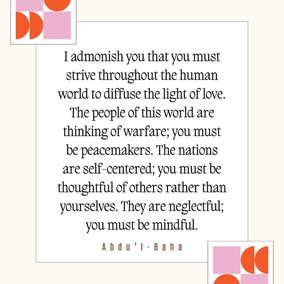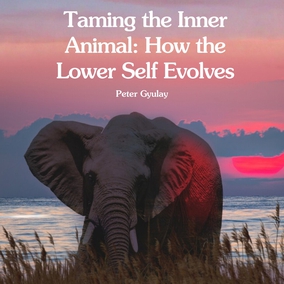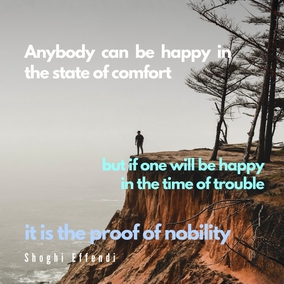The views expressed in our content reflect individual perspectives and do not represent the authoritative views of the Baha'i Faith.
In an era when we all write, all the time—whether for school, publications or on social media—does our writing really represent a force for good?
Writing has always provided a powerful tool to educate people, change opinions and begin movements. In the past, though, only a relative few practiced the craft. Now, in the era of the Internet, writing has become open to anyone, on platforms available all over the world. In articles, Facebook posts, or listicles, almost everyone has a place to showcase their opinions in written form.
Which leaves me wondering: with such a powerful tool at our disposal, do we really know how to use it?
As a writer publishing content online, I have tried hard to come up with a clear set of guidelines for myself when it comes to writing. Whether it involves talking about spiritual issues or movies and entertainment, everything we put out there counts. Everything is being read by someone, even if it’s as simple as a Facebook post.
With the sudden abundance of “fake news” and the ongoing conversations about how much of our social media diet really puts us in a societal “bubble,” we all would do well to consider how our writing affects the people who read it, even for those who don’t necessarily think of themselves as writers.
Baha’u’llah, the founder of the Baha’i Faith, wrote extensively about how to approach people when our aim involves sharing the truth:
Consort with all men … in a spirit of friendliness and fellowship. If ye be aware of a certain truth, if ye possess a jewel, of which others are deprived, share it with them in a language of utmost kindliness and good-will. If it be accepted, if it fulfil its purpose, your object is attained. If any one should refuse it, leave him unto himself, and beseech God to guide him. Beware lest ye deal unkindly with him. A kindly tongue is the lodestone of the hearts of men. It is the bread of the spirit, it clotheth the words with meaning, it is the fountain of the light of wisdom and understanding. –Baha’u’llah, Gleanings from the Writings of Baha’u’llah, p. 289.
When we write, we aim to share the truth as we believe it. Even when we write fiction, or a poem, we try to communicate a truth to the audience. But as Baha’u’llah states in the quote, this truth can be shared and received in different ways.
We might find that we unconsciously share the truth in an unkind manner, or without good will. This becomes especially easy when the culture of the internet encourages correcting strangers with sentences that begin with “Actually …”, or purposefully trying to spark debate or play devil’s advocate. It’s very easy to write something with the subconscious or even conscious intention of making people angry, while fooling ourselves into thinking that we are being helpful by adding to the discourse. But in reality, our sense of superiority—that conviction that I’m right and you’re wrong—takes away from the wisdom that might have existed in our message.
Other times, people will reject what we try to say. Baha’u’llah advises us to leave that person to themselves and pray to God for guidance, all the while making sure that we aren’t being unkind in the slightest. Perhaps the only thing the person will take away from their encounter with us or our writing will be the kindness in our language—and that, Baha’u’llah says, is the “lodestone of the hearts of men,” the thing that ultimately attracts people’s hearts.
The moment we abandon kindness, we abandon any chance we had to do good in that person’s life.
Maybe we don’t always need to put our opinions out there, either. Being vocal about all of our opinions all the time might be common, but it can become exhausting and unnecessary. If we wait patiently, speak only when we have an attentive audience, and focus on becoming a source of wisdom and understanding, then we can channel our writing towards a better cause than reactionary criticism or purposeless words:
O Son of Dust! The wise are they that speak not unless they obtain a hearing, even as the cup-bearer, who proffereth not his cup till he findeth a seeker, and the lover who crieth not out from the depths of his heart until he gazeth upon the beauty of his beloved. Wherefore sow the seeds of wisdom and knowledge in the pure soil of the heart, and keep them hidden, till the hyacinths of divine wisdom spring from the heart and not from mire and clay. – Baha’u’llah, The Hidden Words, pp. 34-35.
No matter where we write or who we write for, our words can become inspiration and guidance for our audience if they express kindness and good will. That’s not to say that any writer should feel superior to any audience, of course; but rather, that we should all try to purify the essence of what we write about until we know it actually helps the world, which makes our writing worthy of being called the fruit of a God-given talent:
O ye loved ones of God! Drink your fill from the wellspring of wisdom, and soar ye in the atmosphere of wisdom, and speak forth with wisdom and eloquence. – Baha’u’llah, Epistle to the Son of the Wolf, p. 98.
















Comments
Sign in or create an account
Continue with Googleor